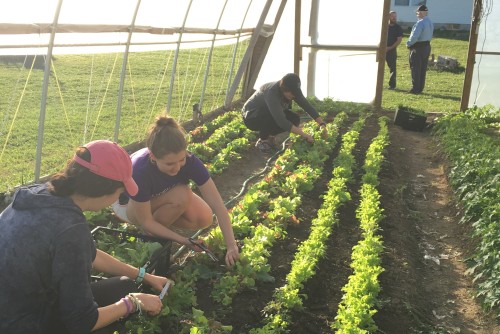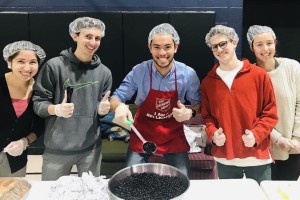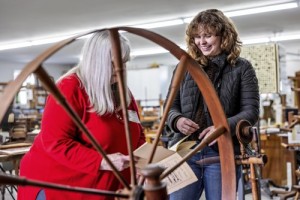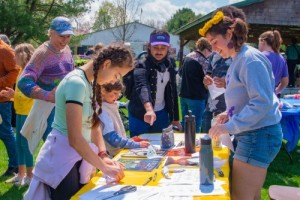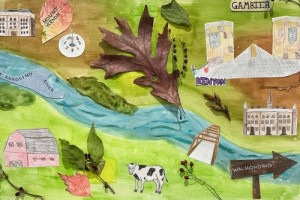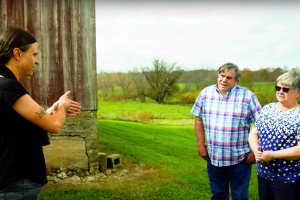The Rural Life Initiative (RLI) continues the legacy of Kenyon’s Rural Life Center, begun in 1998. Under the auspices of the Office for Community Partnerships, and in collaboration with the Office for Green Initiatives, the Rural Life Initiative promotes education, scholarship and public projects in Knox County. In partnership with our surrounding community, the Rural Life Initiative seeks to ensure the vitality of rural life in a rapidly changing society.
What does the Rural Life Initiative do?
The RLI is an umbrella for four key ways to engage with rural living and the local community: volunteerism, local internships, community programming and community-engaged learning & research.
Volunteerism
By participating in volunteerism, students become more civically-minded by: engaging with diverse groups; gaining a better understanding of the root causes of social issues; becoming advocates, problem solvers and collaborators; learning the importance of civic engagement; having firsthand experience with social justice issues; committing to living purposeful lives.
Community Roots: Assist with compost management; garden management; greenhouse cleaning at a local non-profit looking to restore space's historical horticultural use, while also developing agricultural and land stewardship programs.
Knox County Park District: Participate in wildlife monitoring, gather data for the local Project FeederWatch contribution and maintain local geocaching.
Center of Hope Food Pantry: Assist in maintaining and running this local non-profit's mission to create a welcoming environment by keeping the space clean and organized, offering a wide variety of quality foods (including fresh fruits and vegetables) and treating center visitors with dignity.
Local Internships
The Kenyon Community Internship Program (KCIP) gives students the opportunity to gain meaningful work experience during the academic year and engage in learning with the Knox County community. Area employers provide structured internships for 5-10 hours per week during the academic year, allowing students to take on professional projects and develop the skills needed to be successful at Kenyon and beyond. Community partners benefit from student ideas and creativity while gaining support on key operations.
Foundation Park Conservancy: Assist in fulfilling the mission of this nonprofit organization to lead and support the economic stability, preservation, development, programming and promotion of Ariel-Foundation Park in collaboration with the City of Mount Vernon. Ariel-Foundation Park is a world class example of adaptive reuse that honors its industrial heritage and is the focal point for recreation, entertainment and social interaction in Knox County.
Interchurch Social Services: Participate in the Neighbor-to-Neighbor program by assisting customers in submitting this online grant-based application, which prevents disconnection or restores electric service. This includes screening grant guidelines (ex: calculating gross household income), working with AEP and the customer to secure documentation, and ensuring paperwork delivery to the grant agency for audit and approval.
Community Programming
Through a variety of activities from tutoring and mentoring, to guest speakers and community conversations, to other public events, the RLI partners with community organizations and students to build meaningful relationships and purposeful engagement.
¡Hola!: A program for community members of all ages, developed and facilitated by dedicated, multilingual Kenyon students. This program provides one-on-one tutoring sessions and mentorship twice a week with Latino children and adult learners from Knox County at the Wright Center.
Visits: A series of conversations with area residents exploring the character of rural life in partnership with the Office for Green Initiatives that include "Creek of Little Owls: Tying Together Nature and Community" and "The Technological Impact on America in 1850."
Community-Engaged Learning and Research
Community-engaged learning (CEL) is course work designed to address specific community needs and/or access community knowledge; it builds on partnerships between institutions of higher education and surrounding communities to identify and work with public issues that have both academic and public life dimensions. CEL provides students with opportunities for reflection on real-world, hands-on experiences.
The Human Connect(h)ome Project mapped how regions of the human brain are connected to each other in order to better understand neural function as a whole. A goal of this project was to shift perspective and purposefully promote a "connectome" view where students situated themselves within the local environment in Knox County. This exercise purposefully invited these student artists to move beyond the local hub of neuroscience at Kenyon and into different spaces to consider how these areas are connected to their experiences and to neuroscience, both here at Kenyon and in the larger world.
During the Introductory Environmental Laboratory project-based course, students travel to a local farm to collect and analyze soil and water quality samples. Before the fieldwork, students meet with the farm owner and learn about the goals of the farm. Then students work to develop a field sampling plan. After the samples are analyzed, students present their findings to the farm owner and other interested community members.
The Kenyon Summer Scholars Program provides opportunities for students to work in close collaboration with faculty mentors to advance their scholarly or creative interests in the social sciences, humanities, and fine arts. The Office for Community Partnerships sponsors up to two community-based awards for student/faculty teams who identify a common research interest with community partners and undertake that research over the summer. When their research is completed, the Community-Engaged Research Summer Scholars present their research at two public talks. Some examples:
"Kokosing and Community - Water Dances" (community partners: Brown Family Environmental Center and Ohio Department of Natural Resources; faculty mentor: Professor of Dance Julie Brodie)
"Creative Writing Workshops, Dialogue Facilitation, and Community-Engaged Environments" (community partner: Knox County & Mount Vernon Public Library; faculty mentor: Assistant Professor of English Orchid Tierney)
"Mapping the Industrial History of Mount Vernon, Ohio" (community partners: Area Development Foundation, Knox County Historical Society; faculty mentors: Professor of Political Science Pam Camerra-Rowe and Assistant Professor of Physics and Scientific Computing Eric Holdener, who is also the instructional technologist for visual and spatial technologies)
Social Media
Stay up to date on events and opportunities through social media
Established in 1998, the Rural Life Center (RLC) was an award-winning model of college-community engagement. RLC activities advanced Kenyon’s educational mission while addressing community needs and interests. The Rural Life Center aimed to sustain rural character, promote dialogue and provide models for educators and organizations nationwide. The RLC was a pioneer in mainstreaming academic study of rural life throughout the curriculum. Coursework, independent studies, summer internships and extracurricular activities shared local knowledge and addressed regional issues by means of public projects. In all its efforts, the RLC educated students into the community.
Learn more at digital.kenyon.edu/rurallife.
Rural Life Faculty Fellow

Iris Levin
Assistant Professor of Biology & Environmental Studies
The Rural Life Faculty Fellow is a member of Kenyon’s faculty with a compelling vision of a project or course that would enhance the study of rural life. The fellowship recognizes the significance of community-based projects that mobilize faculty and students to explore culture, history, evolution and economy from a local rural context.
Suite 100
400 S. Main Street
Mount Vernon, Ohio
43050
